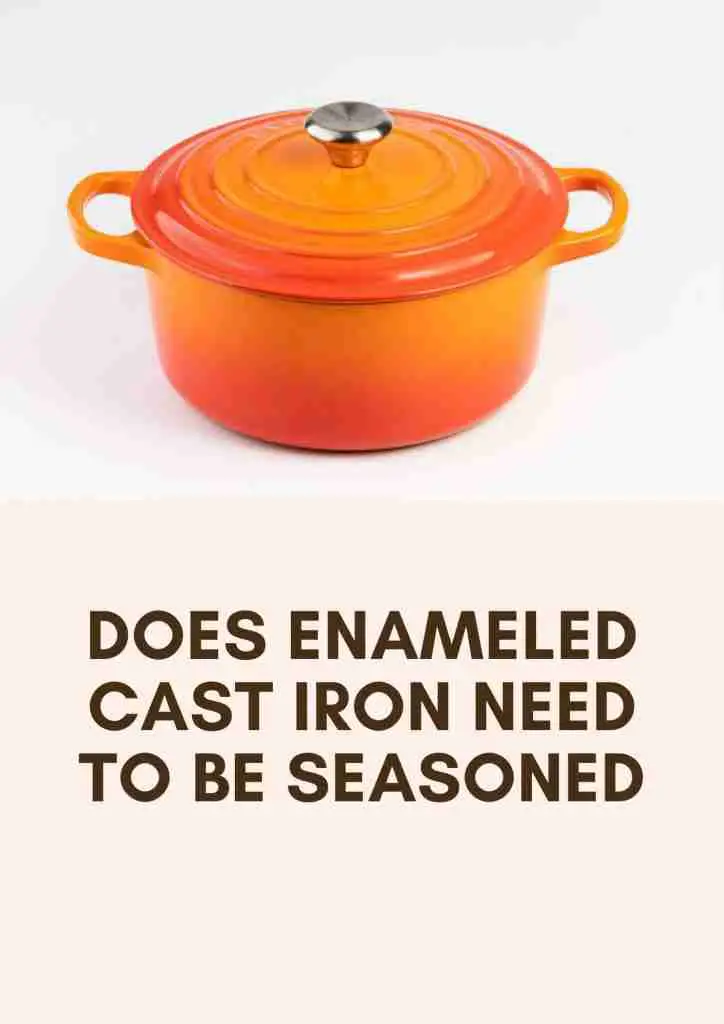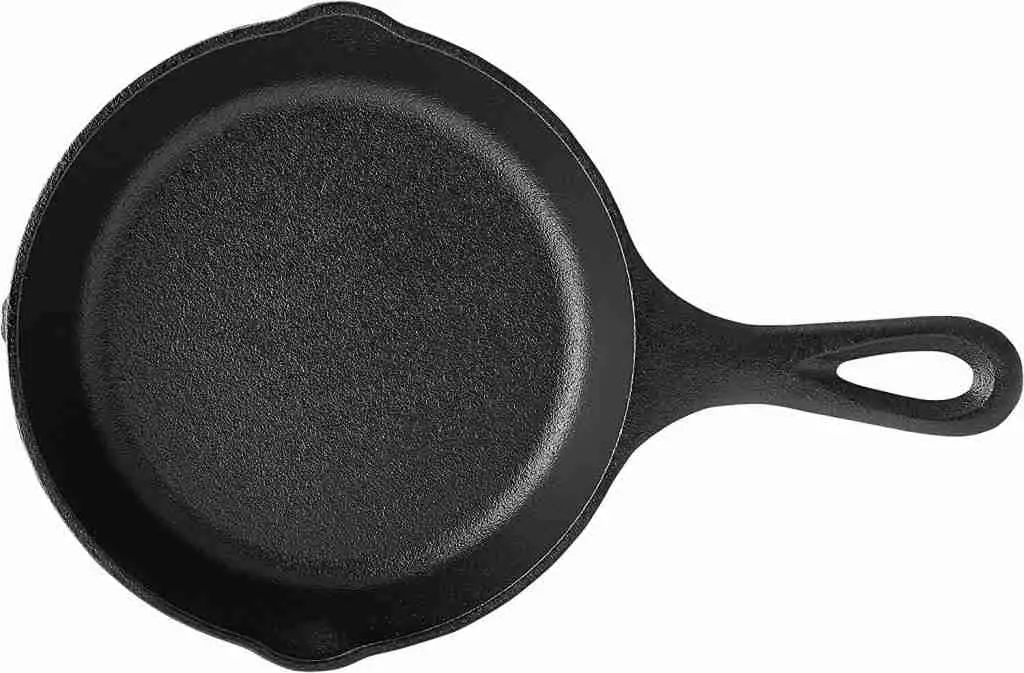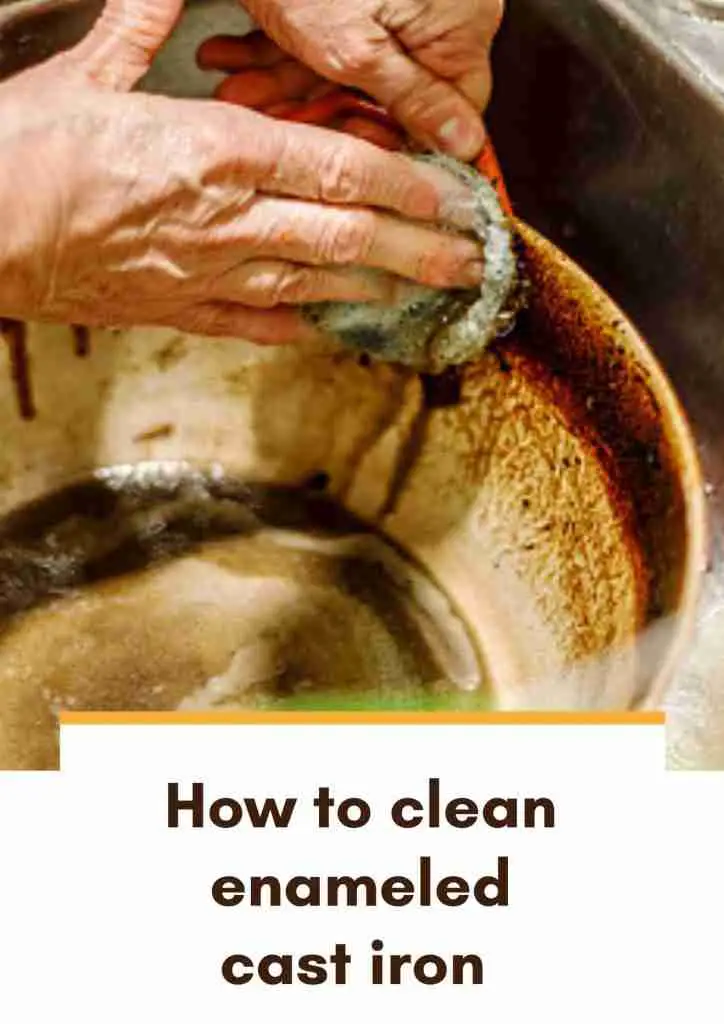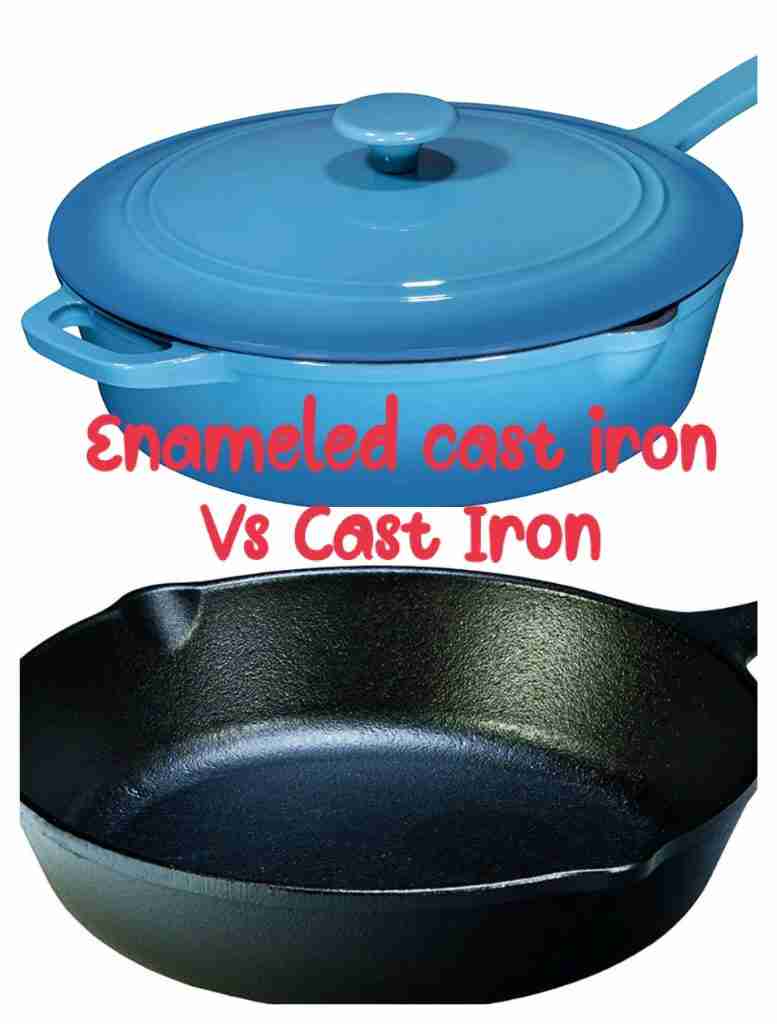Enameled cast iron will always be a versatile kitchen staple for stir-frying, searing, sautéing, and other tasks. It is the go-to cookware that eliminates the need for raw cast iron seasoning and maintenance.
Enameled cast iron is preferred by food enthusiasts and professional chefs for a variety of reasons, including resistance to staining, chipping, cracking, and dulling.
Despite these benefits, does enameled cast iron need to be seasoned since it is coated? To get the most out of your enameled cookware, having the right information will help you get the best results for all of your kitchen tasks.
DOES LE CREUSET CAST IRON NEED TO BE SEASONED
Seasoning is not required for Le Creuset enameled cast iron. However, additional seasoning is entirely up to you.
DOES ENAMELED CAST IRON NEED TO BE SEASONED

Enameled cast iron can be used right away without seasoning because it is designed with a glass-based coating baked unto a raw cast iron. Enameled cast iron, on the other hand, can be seasoned especially the rim to protect the exposed cast iron surface, improve its nonstick ability, and prevent burning and crusting on the enameled surface.
READ ALSO: CAST IRON COOKWARE ADVANTAGES AND DISADVANTAGES
READ ALSO: CAST IRON COOKWARE MADE IN THE USA
HOW TO SEASON ENAMELED CAST IRON

It’s not difficult to season enameled cast iron. As previously stated, enameled cast iron does not require seasoning like traditional or raw cast iron skillets.
Follow the steps below to quickly and easily season your enameled cast iron:
- Use a paper towel to rub a light coating of neutral, high smoke-point oil (canola, grapeseed, or avocado) that deepens on your choice.
- Gently rub this seasoning oil inside the enameled cast iron and especially the edge or rim where we have exposed raw cast iron.
- After that, place the enameled cast iron upside down in an oven to bake for at least 1 hour at about 350 degrees Fahrenheit.
- After one hour, allow the now seasoned enameled cast iron to cool down. Then store in a dry place.
- NOTE: You could also use a baking sheet inside the oven to keep the seasoned oil from dripping on the enameled skillet. However, we advise against using too much oil for seasoning.
READ ALSO: DOES CAST IRON WORK ON ELECTRIC STOVE
HOW TO CLEAN ENAMELED CAST IRON

Cleaning enameled cast iron is quick and easy because of its enamel natural patina. To begin, enameled cast iron can be washed in the dishwasher but we highly recommend hand washing in order to preserve the enamel’s shine and interior enameled coating.
Another reason we recommend hand washing for enameled cast iron is that the natural coating known as patina improves cooking results and using hard substances or a dishwasher can remove the coating.
HOW TO CARE FOR ENAMELED CAST IRON
Enameled cast iron is useful for a variety of recipes. They are ideal for slow cooking and preserving food flavor.
However, if you want your enameled cast iron to last, you must follow the kitchen star cookware’s dos and don’ts.
Here are some tips for caring for your enameled cast iron cookware:
- If you are using an enameled cast iron for the first time, wash the skillet or pan in hot soapy water then rinse and dry thoroughly before use.
- You are aware that the enameled cast iron has a coating, so it is recommended that you do not use metal utensils on the surface. Instead, use wood, nylon, or silicone utensils to avoid chipping or scratching the coating.
- Do not cut food within the enameled cast iron instead use a cutting board.
- Do not stack your enameled cast iron pans or skillets on each other, this could damage the enameled coating.
- Do not use the enameled cast iron for dry cooking. Kindly use butter, oil, or liquid in the skillet pot or pan before you start cooking.
- We recommend a medium heat setting for your enameled cast iron for durability.
- After cooking with the enameled cast iron, allow it to cool down before washing because pouring cold water into the hot enamel vessel can shock and damage the enamel coating.
- Avoid soaking enameled cast iron in water because the exposed iron edges may rust.
- In case of food stuck to your enameled cast iron, use soap, hot water, and a non-abrasive pad to gently scrub it off.
ENAMELED CAST IRON VS CAST IRON

Just before I explain the difference between enameled cast iron vs. Cast iron. Let me state here that we have two types of cast iron; we have the traditional or raw cast iron and the enameled cast iron.
Below is a quick comparison between the enameled and traditional cast iron:
| ENAMELED CAST IRON | TRADITIONAL (RAW) CAST IRON |
| It has a coating on the surface hence the name enamel cast iron. | It is raw bare cast iron without coating. |
| Very easy to clean | Takes time to clean. |
| Doesn’t rust | It is vulnerable to rust. |
| Good for preparing acidic food without fear of iron leaching into your food. | Iron can leach into your food when preparing acidic foods. |
| You can store food overnight without fear of health issues. | It is not advisable to store food overnight in your traditional cast iron. |
| Doesn’t necessarily require seasoning, unlike the raw cast iron. | Requires all-around and deep seasoning to keep it durable. |
| You will mostly find Enameled cast iron in Dutch oven shapes. | Exist mainly in pots, pans, and cookware shapes. |
ENAMELED CAST IRON COOKWARE PROS AND CONS
While many professional chefs and food enthusiasts prefer enameled cast iron, it does have some drawbacks. While enameled cast iron is useful for preparing acidic foods, its weight makes it unsuitable for senior citizens.
We know that enameled cast iron will not leach harmful chemicals into your food due to the coating, but metal utensils will peel off the coating.
Please read this comprehensive guide to learn more about the benefits and drawbacks of enameled cast iron.
ENAMEL CAST IRON HEALTH RISK
Consumers are always concerned about their health when selecting not only cookware but also dinnerware because both are used on a daily basis for cooking and eating.
The coating used to cover the raw cast iron is one of the reasons consumers are concerned about enamel cast iron.
First, is the coating dangerous? What kind of material is it? Is the enamel coating harmful to one’s health?
Second, enamel cast iron cookware is covered in an enamel coating, which does not react with any food, making it completely non-toxic and safe to use.
Thirdly, premium enamel cast iron like the Le Creuset enamel cast iron says that its products aren’t made with lead or cadmium and their manufacturing process complies with the California Proposition 65, which is the most stringent standard in the world for these elements (approx. 10 times lower than “acceptable” limits).
Finally, if you are not convinced that the enameled cast iron skillet poses no health risk, we recommend that you consult a professional who will conduct a lead and cadmium test to determine the level of toxicity if any.
Please read this guide to learn more about the health risks of enameled cast iron. Is it safe to use enameled cast iron cookware?
HOW DO YOU KEEP FOOD FROM STICKING TO ENAMELED CAST IRON?
The easiest way to keep food from sticking to your enameled cast iron is to heat the cookware on medium heat for two to three minutes, then add a thin layer of oil before adding the food. The hot cookware combined with the oil prevents it from sticking.
WHAT CAN YOU NOT COOK IN CAST IRON?
When cooked for an extended period of time, highly acidic foods such as vinegar, tomato sauce, and citrus can eat away at the seasoning.
Extremely alkaline foods, such as beans, should not be cooked for an extended period of time because the thin layer of seasoning on the pan can be damaged.
We recommend avoiding acidic foods or recipes with higher liquid contents for longer periods of time until the seasoning has established itself.
CONCLUSION
After conducting extensive research on the subject, does enameled cast iron need to be seasoned, I have carefully responded to the question above.
Enameled cast iron, unlike traditional or raw cast iron will always be known for its beneficial protective coating on the surface of your cookware.
This enamel coating also protects your cookware against rust, making it sturdier and long-lasting, and the slick enamel coating keeps food from sticking, scorching, or crusting on the top.
If you’re concerned about your health and looking for the best cookware material, try enamel cast iron because it can prevent iron from leaching into your meals.
